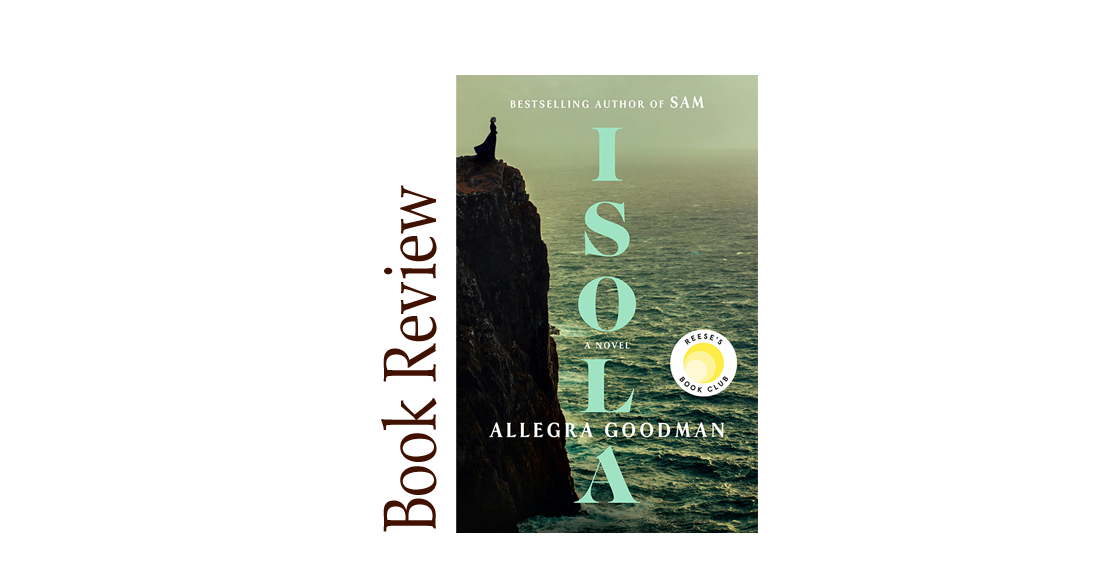- Date Published:
February, 2025 - Length:
368 pages—Listening Time: 12 hr 54 minutes - Genre:
Historical Fiction, General Fiction - Setting:
16th century, France and a remote island in the Gulf of St. Lawrence, a part of New France which is today Canada - Awards:
Reese's Book Club Pick February 2025; LibraryReads Monthly Pick Top Ten February 2025 - Languages:
English - Sensitive Aspects:
Physical and psychological abuse, brutal survival violence, exploitation, abandonment, historic trauma, raw portrayal of suffering - Movie:
There's no news of a film adaptation in progress. - Recommended for Book Club:
Yes

I have to admit, I went into Allegra Goodman's Isola with some reservations. I really thought that I wouldn't like it. Maybe it was the 16th-century court gentility premise that initially made me skeptical, or perhaps I was just having one of those reader phases where nothing seemed to click. Whatever the case, I'm delighted to say that this book completely caught me off guard—in the best possible way.
When a novel manages to capture both the sharp social wit of Jane Austen and the rugged, untamed spirit of Jack London, you know you're in for something special. Isola is precisely that rare literary gem—a book that weaves together the intimate human dramas of the 16th-century social elite with the raw, elemental power of the natural world.
At first glance, you might wonder how any author could successfully marry these two seemingly disparate literary traditions. After all, what could drawing room conversations and wilderness survival possibly have in common? But Goodman pulls off this ambitious fusion with remarkable skill, creating a narrative that feels both elegantly refined and thrillingly wild.
What makes Isola so compelling is how Goodman uses this unique combination to explore timeless themes of human resilience, community, and the ways we adapt when stripped of our familiar comforts. Whether her characters are parsing the subtle meanings behind a carefully worded conversation or figuring out how to survive another day in an unforgiving landscape, they're always fully, recognizably human—flawed, hopeful, and utterly engaging.
There's something wonderfully humbling about being proven wrong by a novel, especially when you realize you've discovered a gem you might have otherwise overlooked. Goodman has crafted something here that feels both intimate and expansive, and I find myself eager to share why Isola managed to win over this initially doubtful reader. Sometimes the books that surprise us the most are the ones that end up staying with us the longest, and I have a feeling this might be one of those for me.

Isola by Allegra Goodman is a sweeping historical novel inspired by the true story of Marguerite de la Rocque, a 16th-century French noblewoman whose life is upended by betrayal, exile, and an extraordinary struggle for survival. Born into privilege but orphaned as a child, Marguerite is raised in a château under the guardianship of her cousin, Jean-François de Roberval, who squanders her inheritance and treats her as a pawn in his ambitions. When Marguerite’s engagement to an unsuitable man falls apart, Roberval forces her to accompany him on an expedition to New France (now Canada), ostensibly to establish a colony.

On the ship, Marguerite forms a forbidden relationship with Roberval’s secretary, and when their affair is discovered, Roberval punishes them both—abandoning Marguerite, her lover, and her devoted nurse, Damienne, on a desolate, rocky island off the coast. With only meager supplies, the trio must endure extreme cold, hunger, and the harsh realities of nature in an unforgiving environment. Tragedy and loss follow—the deaths of her companions leave Marguerite utterly alone, and her will to survive is tested to the limit.
Marguerite’s transformation is the heart of the story. Once a sheltered noblewoman, she becomes resourceful and resilient, learning to hunt, gather, and find meaning in solitude. Through her trials, she questions her faith, her identity, and the societal structures that have defined her life. Goodman’s prose is evocative and immersive, capturing both the brutality of Marguerite’s circumstances and the quiet beauty of her inner journey. The novel does not shy away from the psychological and spiritual toll of exile, nor does it romanticize survival; instead, it presents a raw, unflinching portrait of a woman reclaiming agency in a world that has tried to erase her.
Goodman deftly blends historical detail with lyrical storytelling, offering a nuanced exploration of what it means to lose everything—and yet find a way to endure and, ultimately, to forge a new sense of self. While the novel is rooted in the 16th century, its questions about power, survival, and identity resonate powerfully in the present day, making it both a captivating historical epic and a timeless reflection on the human spirit.
Isola is not merely a castaway tale; it is an origin story for female autonomy. Goodman braids brutal nature writing with courtly intrigue, asking how much of a woman can be stripped away before what remains is purely, defiantly hers.

You should read Isola by Allegra Goodman for a powerful, immersive journey into the resilience of the human spirit, vividly set against a backdrop of historical adversity. Here’s why this novel stands out:
A True Historical Tale Reimagined
Isola is inspired by the true story of Marguerite de la Rocque, a 16th-century French noblewoman who was abandoned on an island in what is now Canada by her unscrupulous guardian after falling in love with his servant. The novel vividly brings to life the trials, heartbreak, and ingenuity of a woman left to survive in the harshest conditions, blending meticulous historical research with imaginative storytelling.
Deeply Emotional and Thought-Provoking
Goodman’s novel is not a light or easy read—it is raw and unflinching in its portrayal of hardship, injustice, and loneliness. It covers the themes of faith, love, loss, and the struggle for autonomy in a world dominated by powerful men. Marguerite’s journey from privilege to peril, and her fight to retain her humanity, make for a story that lingers long after you turn the last page.
Rich, Beautiful Writing
Critics and readers alike praise Goodman’s elegant, evocative prose that immerses you in both the physical and emotional landscapes of Marguerite’s world. The writing is lush yet precise, making the historical setting feel authentic and the characters deeply real. In her hands, Marguerite’s growth from a vulnerable young woman to a resilient survivor is both believable and inspiring.
Universal Resonance
While set in the 16th century, Isola explores questions about identity, survival, and what it means to truly live—themes that resonate powerfully today. Goodman’s exploration of resilience and self-discovery speaks to the universal human experience, offering inspiration and hope even in the face of despair.
An Unforgettable Reading Experience
Reviewers describe the novel as “riveting,” “mesmerizing,” and “a stunning achievement.” It is the kind of story that grips you from the first page, combining historical intrigue with an urgent, personal drama—making it an ideal choice for book clubs and solo readers alike.


Get Allegra Goodman Books
Allegra Goodman’s writing is characterized by precise, emotionally nuanced prose that draws tender yet unflinching portraits of her characters, often exploring the complexities of family, faith, and intellectual life with both aesthetic delicacy and sharp wit.
Bookshop.org was created as a socially conscious alternative to Amazon, with the goal of helping local, independent bookstores thrive. This is why Readers With Wrinkles supports their efforts. Please join us in this effort by purchasing your next read here.

If you enjoyed Isola by Allegra Goodman, there are several books—ranging from historical fiction with immersive settings and resilient heroines to thoughtful character studies—that you might appreciate. Here’s a curated list based on similarities in themes, setting, and tone, drawn from reader recommendations and literary sources:
- The Good People by Hannah Kent
Like Isola, Kent’s work explores historical hardship, the natural world, and women’s resilience in isolated environments. - Wild Dark Shore by Charlotte McConaghy
A novel with a strong sense of place, survival, and psychological depth, set against a challenging landscape. - Heartwood by Amity Gaige
A focus on family, survival, and a richly drawn sense of place, qualities also found in Goodman’s storytelling. - Hamnet by Maggie O’Farrell
A deeply personal historical novel featuring an intimate portrait of a family and a woman facing loss and adversity, not unlike the protagonist in Isola. - Matrix by Lauren Groff
Historical fiction with a strong, complex heroine navigating a forbidding environment and societal constraints, similar to Marguerite de la Rocque’s journey in Isola. - The Frozen River by Ariel Lawhon
Based on a real-life historical figure, this novel offers a compelling female protagonist, meticulous historical detail, and themes of justice and survival. - The Mountains Sing by Nguyễn Phan Quế Mai
A multi-generational story of survival and family bonds, echoing the resilience found in Isola. - Middlemarch by George Eliot
A classic novel of social realism and character exploration, for those who admired Goodman’s attention to human complexity. - Broken Country by Lee Conell
A novel with vivid characterization and immersive settings. - Pride and Prejudice by Jane Austen
Recommended for readers who appreciated the relational dynamics and societal constraints in Isola. - The Hathaways Complete Series by Lisa Kleypas
For those interested in historical romance with strong, independent heroines. - In Memoriam by Alice Winn
A moving historical novel about survival and relationships in a harsh world.

Isola Printable BOOKMARKS
Transform Your Reading Experience with These Gorgeous, Ready-to-Print Bookmarks!
Your book club will love this special memento of this incredible book!


Comments